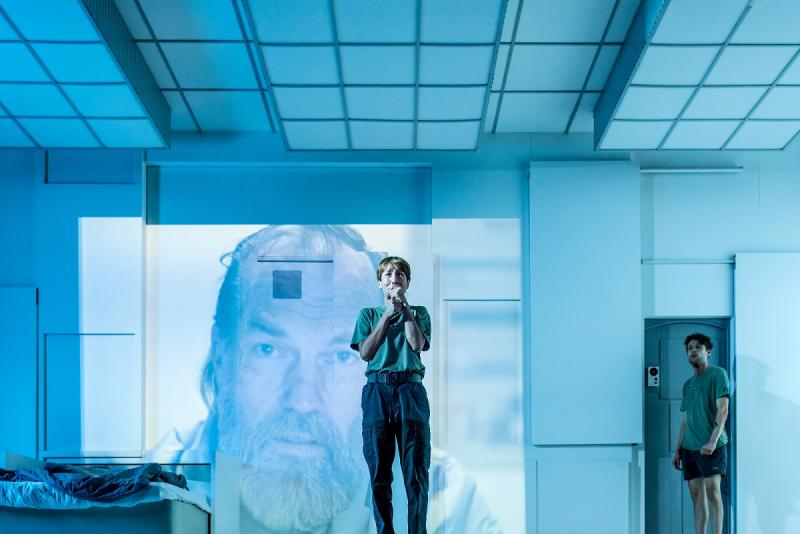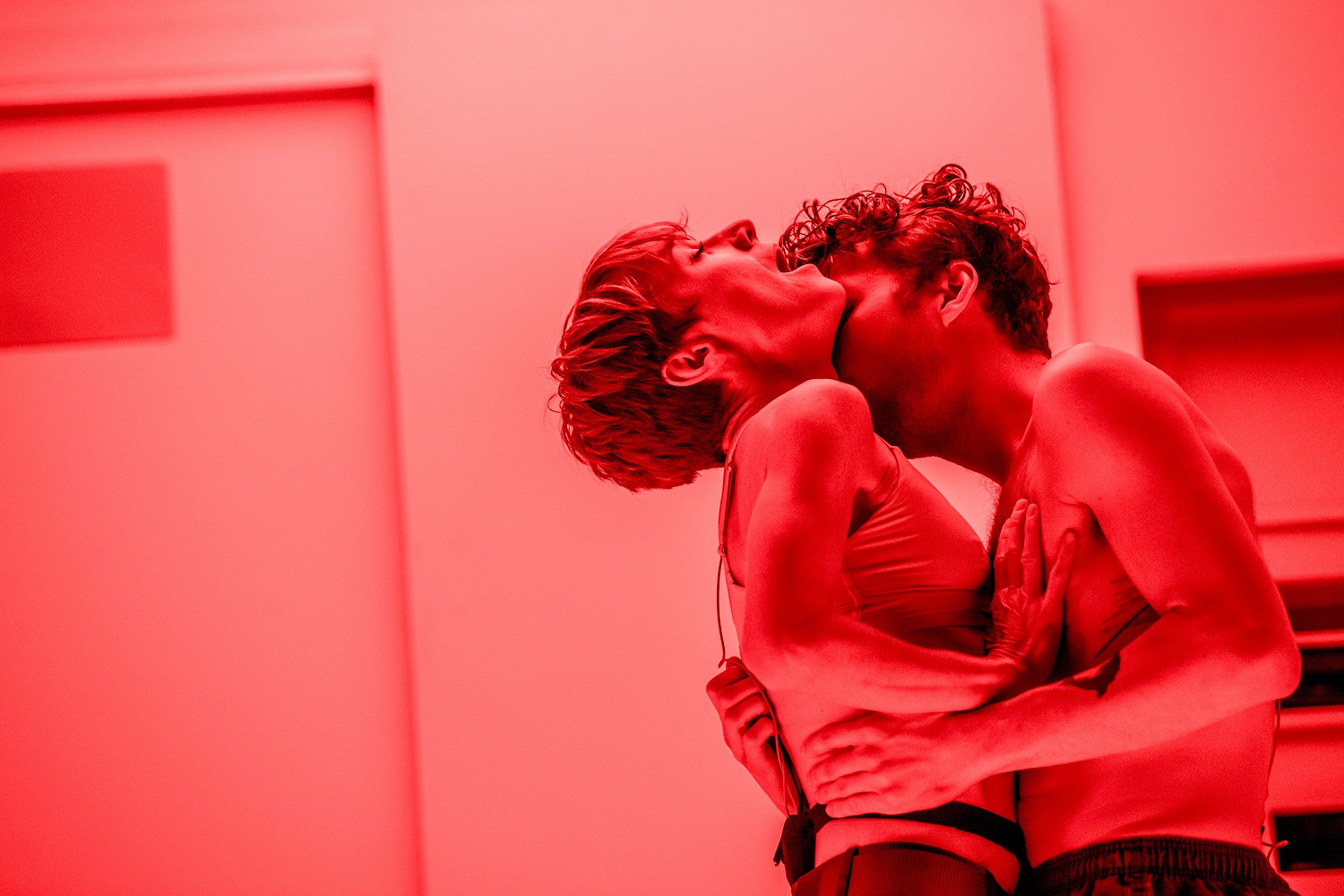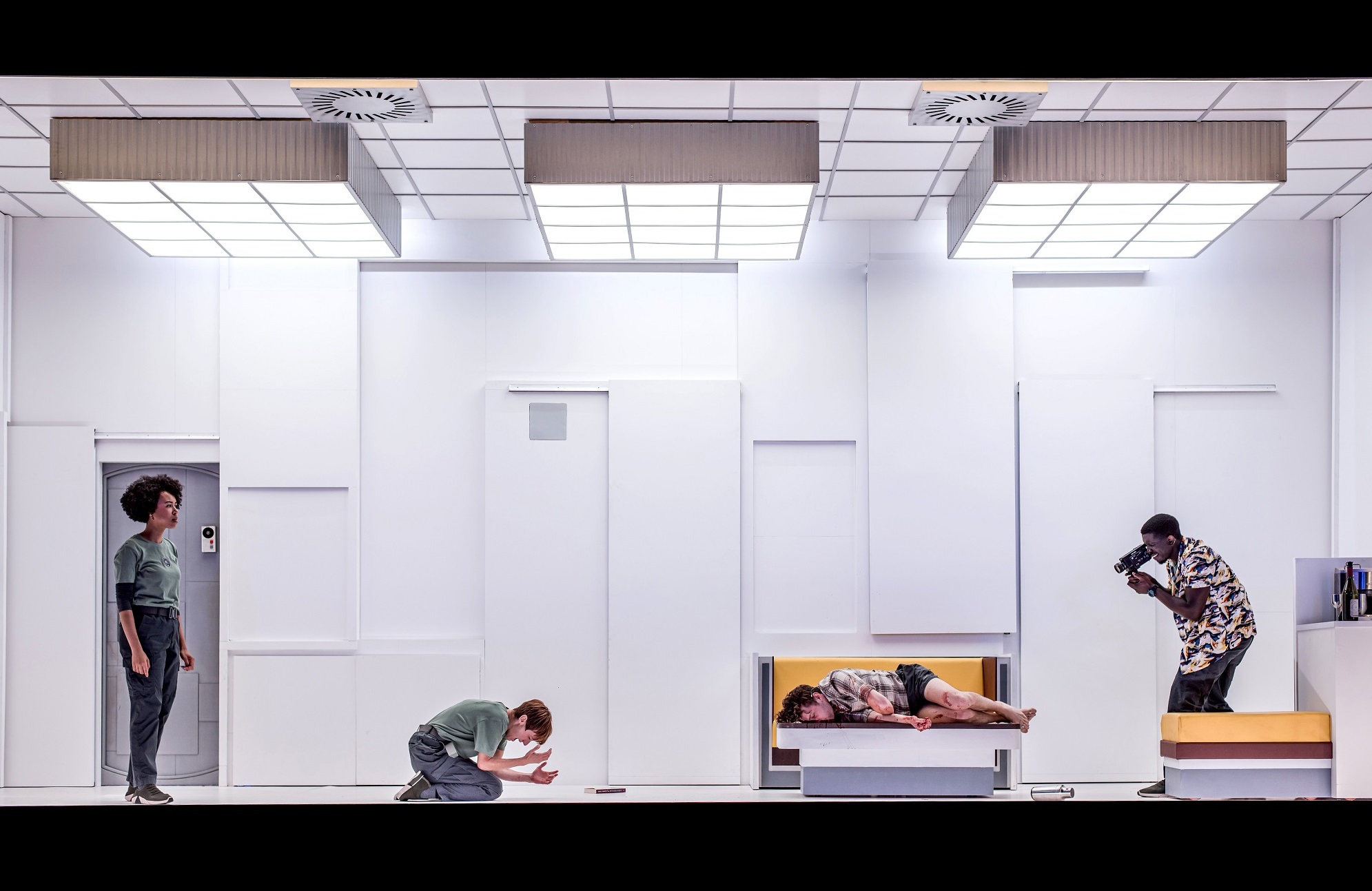Solaris, Lyric Hammersmith review - moving and finely cerebral | reviews, news & interviews
Solaris, Lyric Hammersmith review - moving and finely cerebral
Solaris, Lyric Hammersmith review - moving and finely cerebral
David Greig’s dream-drama of cosmic loneliness is sci-fi at its most philosophical

David Greig’s reimagining of Stanisław Lem’s 1961 novel has brought a masterpiece of intellectual science fiction back to its philosop
The process reaches its culmination when the piece’s central character, the psychologist Kris Kelvin (Polly Frame) who reaches the space station at its beginning, confronts a “manifestation” from her past in the form of a long-dead lover, Ray (Keegan Joyce). Before that the two crew members whom she has joined, Dr Sartorius (Jade Ogugua) and Dr Snow (Fode Simbo), have experienced their own “visitors”, forms of lesser but ever-growing complexity. The colleague that Kelvin was really looking forward to meeting, Dr Gibarian, has taken his own life to escape the final stages of cancer, and has left a series of video messages behind to enlighten her on what the expedition has discovered in the two years or so it has been investigating Solaris. Australian screen star Hugo Weaving plays Gibarian, who appears via shaky video playback, the technology here seeming to date from the Nineties, half way between the time of the story’s creation and the present day.  Solaris is best known for its screen adaptations – among them the 1972 classic from Russian master Andrei Tarkovsky and the George Clooney-starring 2002 version by Steven Soderbergh – in which that central relationship rather came to dominate (Lem himself opposed such a tendency, countering that he had titled his book “Solaris” rather than “Love in Outer Space”). Greig keeps our attention as much on Lem’s ideas themselves, with especial emphasis on how we confront the “other” that is an inseparable part of our consciousness. He’s reversed the genders of Kris and Ray, avoiding associations of the apparition with any sort of female archetype, and giving Frame’s character a more pronounced confidence: that she begins proceedings very much in control makes her later development all the more striking. (Pictured above, Polly Frame, Keegan Joyce)
Solaris is best known for its screen adaptations – among them the 1972 classic from Russian master Andrei Tarkovsky and the George Clooney-starring 2002 version by Steven Soderbergh – in which that central relationship rather came to dominate (Lem himself opposed such a tendency, countering that he had titled his book “Solaris” rather than “Love in Outer Space”). Greig keeps our attention as much on Lem’s ideas themselves, with especial emphasis on how we confront the “other” that is an inseparable part of our consciousness. He’s reversed the genders of Kris and Ray, avoiding associations of the apparition with any sort of female archetype, and giving Frame’s character a more pronounced confidence: that she begins proceedings very much in control makes her later development all the more striking. (Pictured above, Polly Frame, Keegan Joyce)
(If you're looking for a different kind of cinematic parallel, this Solaris somehow brings associations with Denis Villeneuve’s 2016 film Arrival, in which Amy Adams played another specialist protagonist in a story of the human race struggling to communicate with an alien life form through means beyond conventional language; it’s also another world where exposure to something from beyond our universe overturns the traditional definition of time as something running from past to future, meaning that you can have “memories” of future events.)
Director Matthew Lutton has created an ambitiously immersive experience appropriate for a work that aspires towards the cosmic
The confluence between forms of alien life and those of artificial intelligence has surely become more acute since Lem wrote his story: the way in which the planet Solaris, trying to communicate with humans, transforms itself into projection-versions of them parallels today's attempts at creating replica-variations of the human race for AI purposes. How that issue could shine a light on the future ethical preoccupations of science isn’t a topic that Lem explores, limiting himself instead, towards the end of the play, with issues of how humanity has in the past contaminated, and ultimately destroyed, the different species with which it has come into contact (though that theme has certainly gained new currency from an ecological perspective, the idea itself is slightly clumsily handled at the story’s culmination here).
Greig is artistic director of the Royal Lyceum Theatre in Edinburgh and this coproduction with the Malthouse Theatre in Melbourne (and the Lyric) appears to have come about from the Australian company’s visit to Edinburgh two years ago with its production of Picnic at Hanging Rock, also directed by Matthew Lutton (interesting how that story, another book-to-film adaptation, also involves issues like terror of the unknown, with a sense of characters who are at the same time both there and also absent). For this new show, Lutton has worked with his compatriots on the technical front to create an ambitiously immersive experience appropriate for something that aspires towards the cosmic.  Lighting designer Paul Jackson moderates the intense bright glare of the stark interiors of the space station with saturations of red and blue that occasionally jump into sharp contrast, while sound designer/composer Jethro Woodward’s complex score, a presence in the background for much of the production, runs the gamut of emotions from threat to awe. British designer Hyemi Shin traverses a similar range, contrasting the tight interiors of the station’s cabins (which run together with seamless, speedy ease), their white hues and dotted hints of colour, with huge projections of fluctuating water that pulse across the front curtain that periodically descends on the piece’s predominantly short scenes. If there’s an overall dramatic shortcoming, it arguably lies in the very frequent black-out breaks that divide the action across the immediate screen-shaped stage area, an effect almost not unlike cinematic "cuts". (Pictured above, from left, Jade Ogugua, Polly Frame, Keegan Joyce, Fode Simbo)
Lighting designer Paul Jackson moderates the intense bright glare of the stark interiors of the space station with saturations of red and blue that occasionally jump into sharp contrast, while sound designer/composer Jethro Woodward’s complex score, a presence in the background for much of the production, runs the gamut of emotions from threat to awe. British designer Hyemi Shin traverses a similar range, contrasting the tight interiors of the station’s cabins (which run together with seamless, speedy ease), their white hues and dotted hints of colour, with huge projections of fluctuating water that pulse across the front curtain that periodically descends on the piece’s predominantly short scenes. If there’s an overall dramatic shortcoming, it arguably lies in the very frequent black-out breaks that divide the action across the immediate screen-shaped stage area, an effect almost not unlike cinematic "cuts". (Pictured above, from left, Jade Ogugua, Polly Frame, Keegan Joyce, Fode Simbo)
The spare-framed, Australian-accented Joyce is impressive as Ray, apparently nonchalant at the beginning – each new time that he appears, he has no memory of previous scenes – and then increasingly disturbed by the evolving realisation that he exists only as a figment of another’s imagination, but it’s Frame who really stands out, growing in conviction as her fascination with the situation in which she has found herself deepens. There’s real directorial flare to the scenes in which she interacts with Weaving on video – how piercingly vivid his eyes are! – which play with an organic contact between the two characters. Weaving’s Gibarian clearly came to be as totally absorbed by this strange, compelling planet as Kelvin herself becomes, a process you might compare to be taken over by an addiction you know will prove finally fatal. Drawing on profound themes, David Greig’s adaptation, both moving and finely cerebral, persuades us of that fascination.
- Solaris at the Lyric Hammersmith until 2 November
- More theatre reviews on theartsdesk
rating
Explore topics
Share this article
Add comment
The future of Arts Journalism
You can stop theartsdesk.com closing!
We urgently need financing to survive. Our fundraising drive has thus far raised £49,000 but we need to reach £100,000 or we will be forced to close. Please contribute here: https://gofund.me/c3f6033d
And if you can forward this information to anyone who might assist, we’d be grateful.

Subscribe to theartsdesk.com
Thank you for continuing to read our work on theartsdesk.com. For unlimited access to every article in its entirety, including our archive of more than 15,000 pieces, we're asking for £5 per month or £40 per year. We feel it's a very good deal, and hope you do too.
To take a subscription now simply click here.
And if you're looking for that extra gift for a friend or family member, why not treat them to a theartsdesk.com gift subscription?
more Theatre
 Hamlet, National Theatre review - turning tragedy to comedy is no joke
Hiran Abeyeskera’s childlike prince falls flat in a mixed production
Hamlet, National Theatre review - turning tragedy to comedy is no joke
Hiran Abeyeskera’s childlike prince falls flat in a mixed production
 Rohtko, Barbican review - postmodern meditation on fake and authentic art is less than the sum of its parts
Łukasz Twarkowski's production dazzles without illuminating
Rohtko, Barbican review - postmodern meditation on fake and authentic art is less than the sum of its parts
Łukasz Twarkowski's production dazzles without illuminating
 Lee, Park Theatre review - Lee Krasner looks back on her life as an artist
Informative and interesting, the play's format limits its potential
Lee, Park Theatre review - Lee Krasner looks back on her life as an artist
Informative and interesting, the play's format limits its potential
 Measure for Measure, RSC, Stratford review - 'problem play' has no problem with relevance
Shakespeare, in this adaptation, is at his most perceptive
Measure for Measure, RSC, Stratford review - 'problem play' has no problem with relevance
Shakespeare, in this adaptation, is at his most perceptive
 The Importance of Being Earnest, Noël Coward Theatre review - dazzling and delightful queer fest
West End transfer of National Theatre hit stars Stephen Fry and Olly Alexander
The Importance of Being Earnest, Noël Coward Theatre review - dazzling and delightful queer fest
West End transfer of National Theatre hit stars Stephen Fry and Olly Alexander
 Get Down Tonight, Charing Cross Theatre review - glitz and hits from the 70s
If you love the songs of KC and the Sunshine Band, Please Do Go!
Get Down Tonight, Charing Cross Theatre review - glitz and hits from the 70s
If you love the songs of KC and the Sunshine Band, Please Do Go!
 Punch, Apollo Theatre review - powerful play about the strength of redemption
James Graham's play transfixes the audience at every stage
Punch, Apollo Theatre review - powerful play about the strength of redemption
James Graham's play transfixes the audience at every stage
 The Billionaire Inside Your Head, Hampstead Theatre review - a map of a man with OCD
Will Lord's promising debut burdens a fine cast with too much dialogue
The Billionaire Inside Your Head, Hampstead Theatre review - a map of a man with OCD
Will Lord's promising debut burdens a fine cast with too much dialogue
 50 First Dates: The Musical, The Other Palace review - romcom turned musical
Date movie about repeating dates inspires date musical
50 First Dates: The Musical, The Other Palace review - romcom turned musical
Date movie about repeating dates inspires date musical
 Bacchae, National Theatre review - cheeky, uneven version of Euripides' tragedy
Indhu Rubasingham's tenure gets off to a bold, comic start
Bacchae, National Theatre review - cheeky, uneven version of Euripides' tragedy
Indhu Rubasingham's tenure gets off to a bold, comic start

Comments
A terrific review and a very